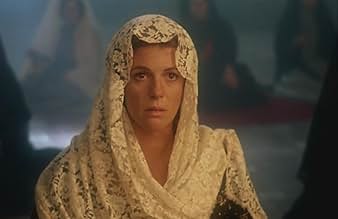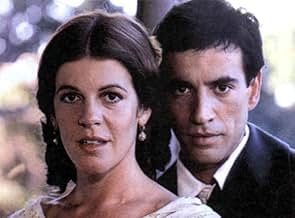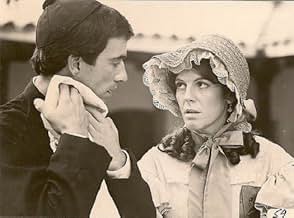NOTE IMDb
6,9/10
1,6 k
MA NOTE
Dans les années 1840 à Buenos Aires, en Argentine, une belle jeune mondaine nommée Camila tombe amoureuse de Ladislao, un prêtre. Après plusieurs tentatives pour combattre ses propres sentim... Tout lireDans les années 1840 à Buenos Aires, en Argentine, une belle jeune mondaine nommée Camila tombe amoureuse de Ladislao, un prêtre. Après plusieurs tentatives pour combattre ses propres sentiments, il succombe finalement à elle.Dans les années 1840 à Buenos Aires, en Argentine, une belle jeune mondaine nommée Camila tombe amoureuse de Ladislao, un prêtre. Après plusieurs tentatives pour combattre ses propres sentiments, il succombe finalement à elle.
- Réalisation
- Scénario
- Casting principal
- Nommé pour 1 Oscar
- 2 victoires et 2 nominations au total
Avis à la une
I would recommend this movie for a variety of reasons. Most importantly, it gives a clear impression of what life was like in Argentina at this time. The power that the government, Rosas, had over the people is mind boggling. The fact that a father could be brainwashed enough to choose the government over the life of his own daughter is sickening! This just illustrates the power and backwardness of Rosas' dictatorship. I also enjoyed this movie for the romantic aspect of the story. It kept you in suspense, while you routed for the couple's escape to happiness. The moving ending of the film leaves you with much to think about.
During the 1800s in Argentina, an oppressive dictator named Rosas rules the country with an iron fist. Everyone must wear a red ribbon to show their loyalty to the man while certain books are banned, among other decrees. A beautiful young lady named Camila has been born into a wealthy family. She is free-spirited and finds the dictators rules are oppressive. Secretly, she borrows risque books from the shopkeeper. By chance, her parish gets a new priest named Ladislao, quite handsome and dedicated. It's almost love at first sight, with the priest trying everything to avoid his feelings. Even when the book seller is executed for circulating banned books, Camila is undeterred. Therefore, the couple secretly elopes and moves to a rural area far from Buenos Aires. But, Rosas orders his soldiers to find them. Will they be discovered? This gorgeous film has sumptuous sets, costumes, and photography. The two stars are incredibly handsome and touching while the horrors of dictatorship are made manifest. Even if you dislike subtitles you won't want to miss Camila. Just have a bucket handy for your tears.
This film is about a doomed relationship between the daughter of a rich fascist-type landowner in Argentina about 1830 or so (after the successful revolution against the Spanish). The new government, it seems, feels that the end justifies the means and repression is used to keep control of the fledgling nation.
Camila finds that she is not attracted to the macho rich suitors but instead finds herself drawn to the new Jesuit priest. Despite common sense and many obstacles, they run off together. What I found most interesting in the movie was the character of her father, who was instrumental in tracking them down and exacting punishment.
In many ways, the plot reminded me of The Thorn Bird mini-series combined with a fascist-like backdrop. A pretty good film overall. Be aware, however, of the nudity. It's NOT as much as you might expect in such a film but considering he's a priest, it's bound to offend some.
Camila finds that she is not attracted to the macho rich suitors but instead finds herself drawn to the new Jesuit priest. Despite common sense and many obstacles, they run off together. What I found most interesting in the movie was the character of her father, who was instrumental in tracking them down and exacting punishment.
In many ways, the plot reminded me of The Thorn Bird mini-series combined with a fascist-like backdrop. A pretty good film overall. Be aware, however, of the nudity. It's NOT as much as you might expect in such a film but considering he's a priest, it's bound to offend some.
This melodrama directed by Maria Luisa Bemberg is a story of a passionate woman who wants nothing more than to pursue her desire for love and life. The movie shows the audience the importance of the church and social classes and enables us to view the attitudes and emotions of people living during the dictatorship of Juan Manuel de Rosas. However, it is evident that Bemberg has a slight bias in that the movie is seen through the eyes of Camila O'Gorman. This film is a wonderful example of how the movies intend to manipulate the viewer, allowing Camila to have all the rights and giving none to Rosas is rather biased. The film strongly emphasizes the dictatorship of Rosas and the viewer is given the opportunity to see the profundity and power of this dictator.
In 1982, the Argentine military government seized the Falkland Islands, also known as Las Islas Malvinas, from the British. The British deployed combat forces to the South Atlantic and recaptured the territory in a war that lasted ten and a half weeks. This led to the downfall of the Argentine military junta and a reversion to democracy, establishing conditions which in 1984 brought to the screen a true story that had been suppressed by political, religious, and/or cultural forces for nearly fourteen decades. It is one of the most popular movies in the history of Argentina, from among those produced by that nation.
Camila refers to Camila O'Gorman, and opens very briefly in her childhood with the arrival at her family's ranch of a stagecoach bearing her grandmother, who is to be placed under house arrest. Camila's father fully consents to the arrangement, siding with the authorities rather than with his mother, who is on the wrong side of contemporary political affairs. The opening then shifts forward to Buenos Aires, 1847. Camila, now a young woman of about 19, is closeted with and huddled over some newborn kittens she knows will earn her father's disapproval if he discovers them. In the late 1840s, Argentina is under the control of a dictator, General Rosas, and the federals. The unitarians, some in exile and others trying to stay under the radar (as it were), are the latent opposition.
The plot can be summarized simply: A socialite daughter from a wealthy family falls in love with a (celibate) Jesuit priest. It is not only taboo in a Catholic society, but is taboo in a Catholic society at the wrong place and the wrong time, and neither the federals nor the unitarians contribute positively to the outcome. As the kittens meet their fate and the opening credits conclude, we view a statement dedicating the movie: "In memory of Camila O'Gorman ." History, and director Maria Luisa Bemberg, are serious about the advisory, so be forewarned, and be aware also that the movie has an R rating. The film coloring is memorable, and Susu Pecoraro in the lead actress role gives a strong performance.
Camila refers to Camila O'Gorman, and opens very briefly in her childhood with the arrival at her family's ranch of a stagecoach bearing her grandmother, who is to be placed under house arrest. Camila's father fully consents to the arrangement, siding with the authorities rather than with his mother, who is on the wrong side of contemporary political affairs. The opening then shifts forward to Buenos Aires, 1847. Camila, now a young woman of about 19, is closeted with and huddled over some newborn kittens she knows will earn her father's disapproval if he discovers them. In the late 1840s, Argentina is under the control of a dictator, General Rosas, and the federals. The unitarians, some in exile and others trying to stay under the radar (as it were), are the latent opposition.
The plot can be summarized simply: A socialite daughter from a wealthy family falls in love with a (celibate) Jesuit priest. It is not only taboo in a Catholic society, but is taboo in a Catholic society at the wrong place and the wrong time, and neither the federals nor the unitarians contribute positively to the outcome. As the kittens meet their fate and the opening credits conclude, we view a statement dedicating the movie: "In memory of Camila O'Gorman ." History, and director Maria Luisa Bemberg, are serious about the advisory, so be forewarned, and be aware also that the movie has an R rating. The film coloring is memorable, and Susu Pecoraro in the lead actress role gives a strong performance.
Le saviez-vous
- AnecdotesThis is the second Argentine film to be nominated for an Academy Award for the 'Best Foreign Language Film' in 1985.
- Citations
Ladislao Gutiérrez: I'm listening, Camila. Talk.
Camila O'Gorman: I'm dying of love, father.
- ConnexionsReferenced in There's Nothing Out There (1991)
Meilleurs choix
Connectez-vous pour évaluer et suivre la liste de favoris afin de recevoir des recommandations personnalisées
- How long is Camila?Alimenté par Alexa
Détails
Contribuer à cette page
Suggérer une modification ou ajouter du contenu manquant































